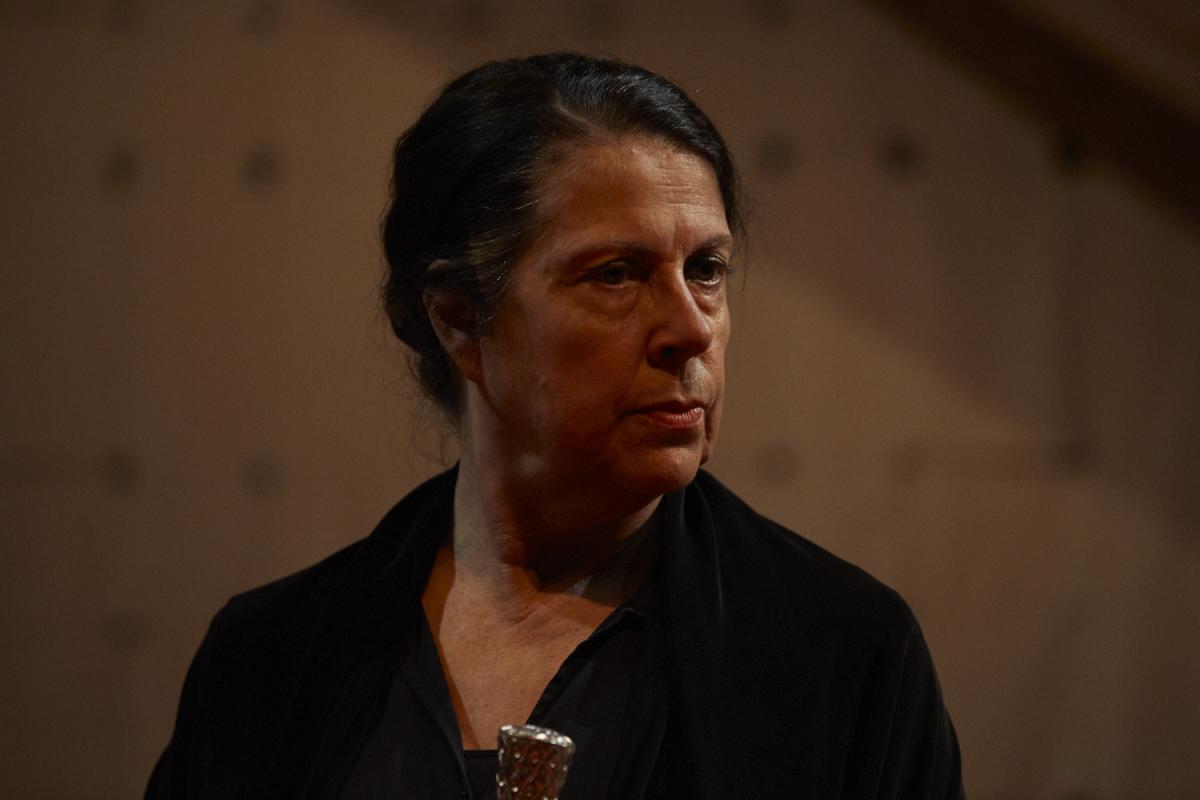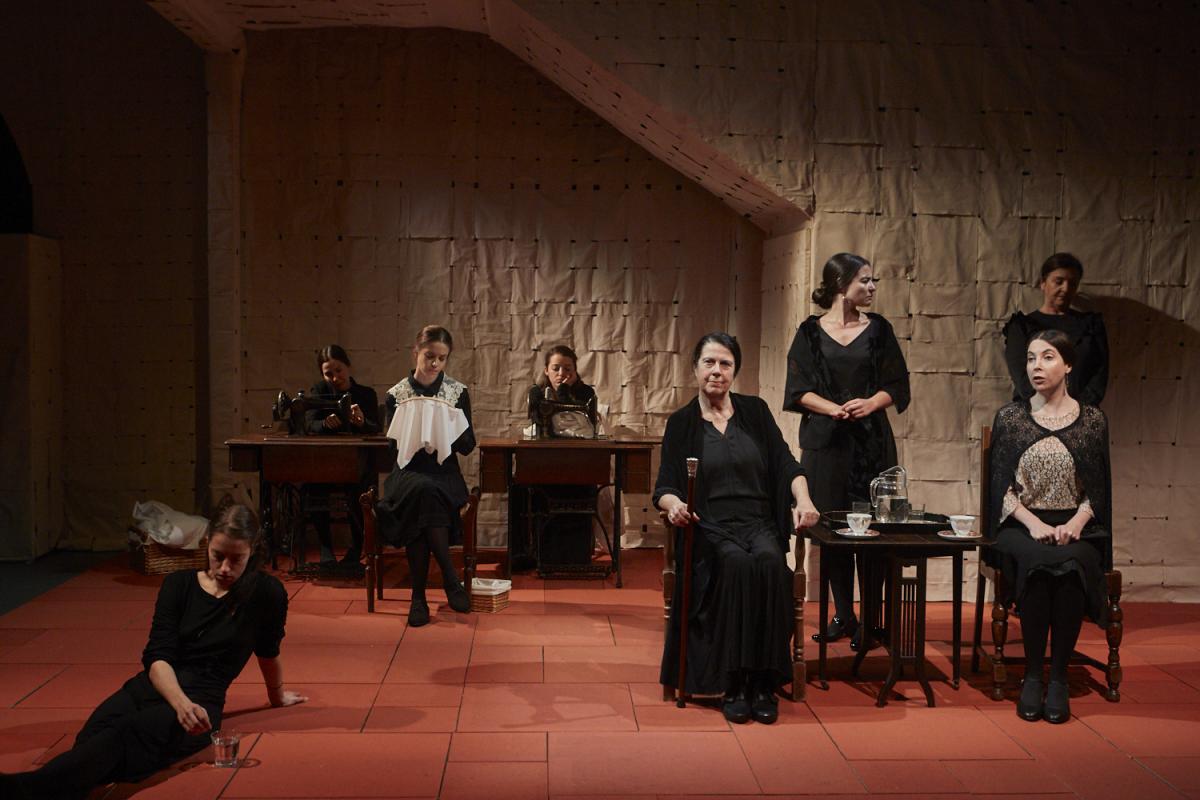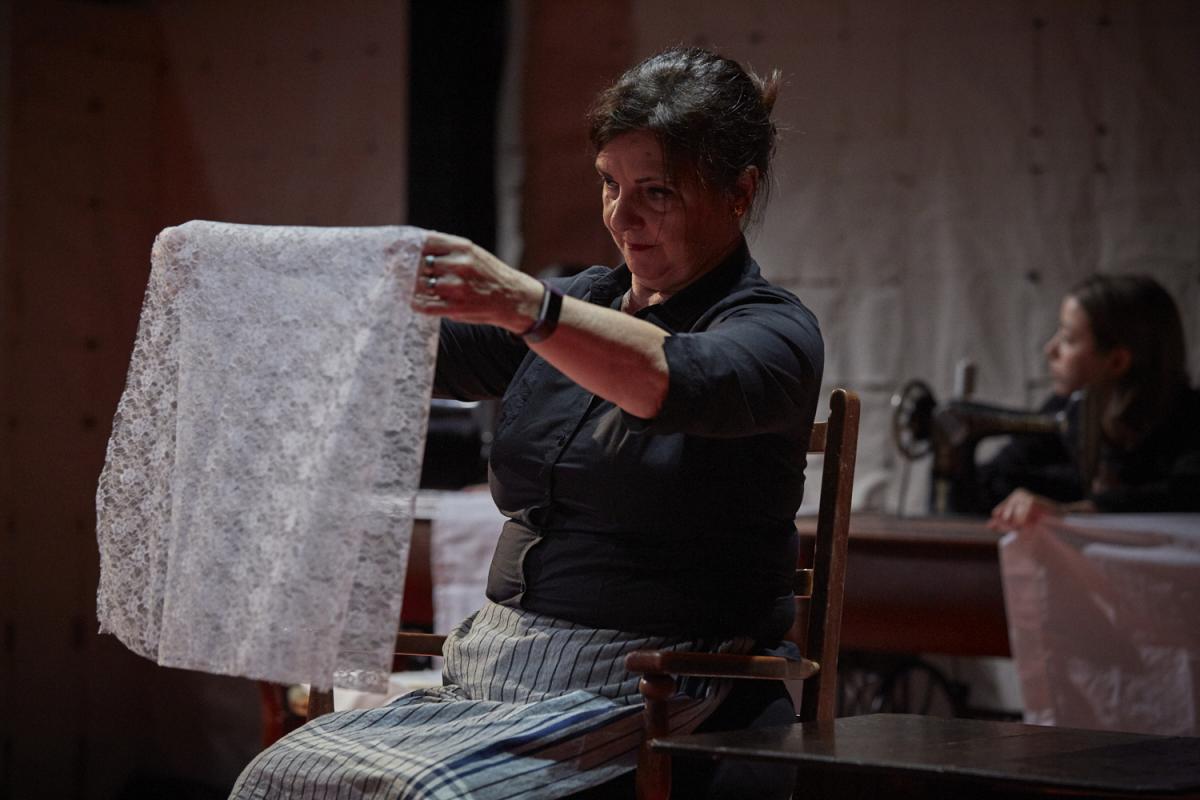'The House of Bernarda Alba' (1936) was the last play written by Lorca before the Falangists murdered him only two months after he had completed the work. Even though Lorca never referred to it as such, it is considered to be part of a ‘Rural Trilogy’ preceded by 'Yerma' (1934) and 'Blood Wedding' (1932). Being banned in Spain, it was first performed at the Avenida Theatre in Buenos Aires in 1945.
The play is set in the dark rooms of the Alba home where Bernarda rules, despotically imposing a devastating 8-year long period of mourning on the household following the death of her husband Antonio Benavides. This level of control drives them to bitterness towards one another, terrified to change the status quo. There are five daughters, Angustias, the eldest (39) Magdalena (30) Amelia (27) Martirio (24) and Adela only 20. There are no coincidences in these names, they emphasize the pain of their situation. Together with Poncie, the Housekeeper, the young maid, and Maria Josefa, Bernarda’s elderly mother, it is a household composed entirely of women trapped inside this inferno, not only due to the intense summer heat but the tyranny of Bernarda Alba herself, who tries to control every thought her girl’s might have.
“I will haunt your dreams!” It is no surprise that the sisters feel that ‘not even their eyes belong to them’.
The girls yearn to marry and be free but they fear what is outside as much as their own emotions that are eating them from within. Even an open door elicits a gasp and silence before they are able to react. No men appear on stage, but their movements are followed longingly by the girls from behind the barred windows, so tantalizingly present and so out of reach. Bernarda reminds them that women should only see men in church and then only see the priest for prayers, and no others.

Bernarda has thwarted previous marriage hopes for the hunchback Martirio, telling herself it had to be so, from a sense of duty, to stop her marrying below her class.
PONCIA: It's just that your daughters are of an age when they ought to have husbands. Mighty little trouble they give you. Angustias must be much more than thirty now.
BERNARDA: Exactly thirty-nine.
PONCIA: (furiously) And she's never had a beau…
BERNARDA: None of them has ever had a beau and they've never needed one! They get along very well.
The only permitted dates for Angustias and her fiancée Pepe El Romano, are no more than conversations through the iron bars of a window. To all this tension, some natural sounds added an unexpected effect to this production. As the theatre is built into a railway arch, there is the sporadic rumbling of the trains. In this play, it was as if the rumblings were emerging from a volcano below, brewing from the repressed sexual energy as the sisters dream of marriage as an escape, but as La Poncia remarks:
“You aren't married, but it's good for you to know… anyway, that two weeks after the wedding a man gives up the bed for the table, then the table for the tavern, and the woman who doesn't like it can just rot, weeping in a corner.”
Above all, Lorca explores repression as an overpowering theme. With strands of an almost pagan interpretation of the power of earth, water and fire on the human soul, there is a close connection with nature, mostly human nature. In ‘Blood Wedding’, the lover’s inability to express their passion for each other leads eventually to violence and death. ‘Yerma’ believes that if she cannot conceive her blood will turn to poison. Her inability to satisfy her obsessive need to have a child likens her to an infertile and barren earth. In Bernarda Alba, the fire of the repressed sexual passions of the daughters burns so intensely that it ends up destroying them all in one way or another.

Lorca suggests that to deny these intense passions can only lead to death, tragedy and violence but as Adela shows, in so many cases despite all her efforts to protect her individuality, it is not enough and cannot not save her either. All the more tragically because Pepe El Romano is clearly not worthy of her love. In effect, The House of Bernarda Alba begins with a death and ends with a death. Her grandmother Maria Josefa sums him up in her delirium: -
“Pepe el Romano is an ogre. All of you want him. But he’ll devour you. Because you’re grains of wheat. No, not grains of wheat. Tongue-less frogs!
The play opens with the endless tolling bells from the funeral service at the church. In every way he can, Lorca openly challenges the repression that he sees in Catholicism with its strict moral codes, that he feels imprison people emotionally in their small villages, killing off all their individuality and joy. He riles against the accompanying hypocrisy that comes with that repression. Bernarda Alba imposes a strict eight-year period of mourning on her young daughters, totally depriving them of their hopes of marriage and a normal life. Her terror of gossip and any loss of respectability overpowers any compassion she might have had for them. Poncia, the housekeeper, is the voice of reason, as is Bernarda’s own mother Maria Josefa, who is kept locked up endlessly in a room. But Bernarda Alba is unable to listen, devoured by her own fears and obsessive sense of duty. So much so, that despite the loss of her child, she cannot stop herself being more concerned about what the neighbours think: -
“My daughter died a virgin! Carry her to her room and dress her as a maiden, no one will dare say a word. She died a virgin! Tell them to ring the bells twice at dawn”!
Bernarda is riddled with hypocrisy. Like a disease, it has eaten up her humanity. Lorca brings out the true nature of man when subject to life under a veneer of respectability. In the opening scene, the sisters are completely covered in black from head to toe, with veils over their heads, totally isolated from the light and each other. Like rigid statues they appear stiff and barely able to move. As the play progresses, they reveal their rage, bitterness, intense jealousies and even hatred. In this process, they also shed their clothes until, by removing layer upon layer, Lorca reveals their inner natures, and they end up writhing on the floor in their nightdresses, their naked feelings out in the open.
These two interpretations of the play are very interesting. The different rhythm and weight of the two languages affect the dynamic on stage in unexpected ways. English is a more cerebral language, more precise, with shorter words and less flowery. Moments of humour arose from the irony and people laughed out loud, especially to ironic comments from Bernarda Alba and the servants. There were no laughs in the Spanish version, one picked up a different vibe altogether. Spanish words are largely two or more syllables, so there is heavier, earthier rhythm with a different intensity, so inevitably the two versions emphasized slightly different aspects of the story as a result.

The performances were all very moving and convincing. Amparo Climent as Bernarda in the Spanish version played with an imposing silence and careful body language, resulting in a formidable and ominous effect. I would never have dared to contradict her. Totally believable, she was genuinely scary. The English Bernarda, on the other hand, played by Mary Conlon was nimbler in her movements and by being more expressive was less menacing but at the same time invited more empathy as her personal inner dilemmas seeped through a bit more. This was a large cast with star performers. The anguish and despair of all the characters are palpable in each and every one, no one was spared.
There is a tragic prophetic touch to this play, as Lorca’s death, right at the start of the Spanish Civil War, heralded years of catholic influenced repression under General Franco in Spain. Lorca’s own homosexuality, considered unacceptable at the time, could have helped him understand the despair of having to repress one’s emotions for the sake of appearances, as he was so extraordinarily acute in his comprehension of how those women could have felt. Perceptively, he called this work “a drama about women in the villages of Spain”.
La Casa de Bernardo Alba returns to the Cervantes Theatre this month. For more info visit: http://www.cervantestheatre.com















